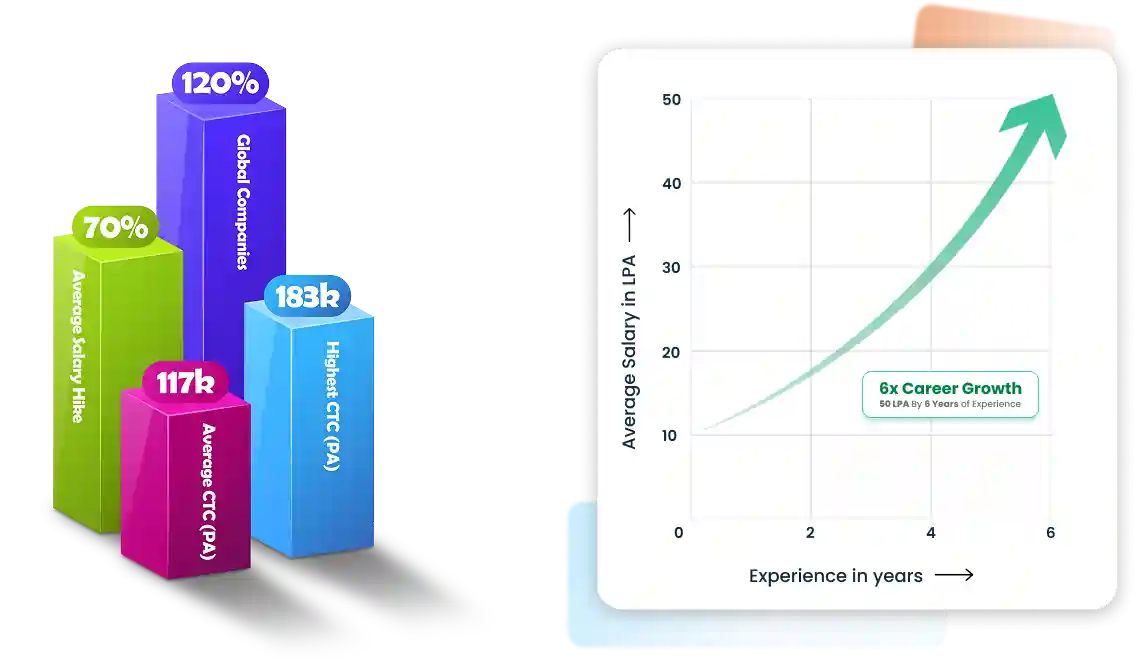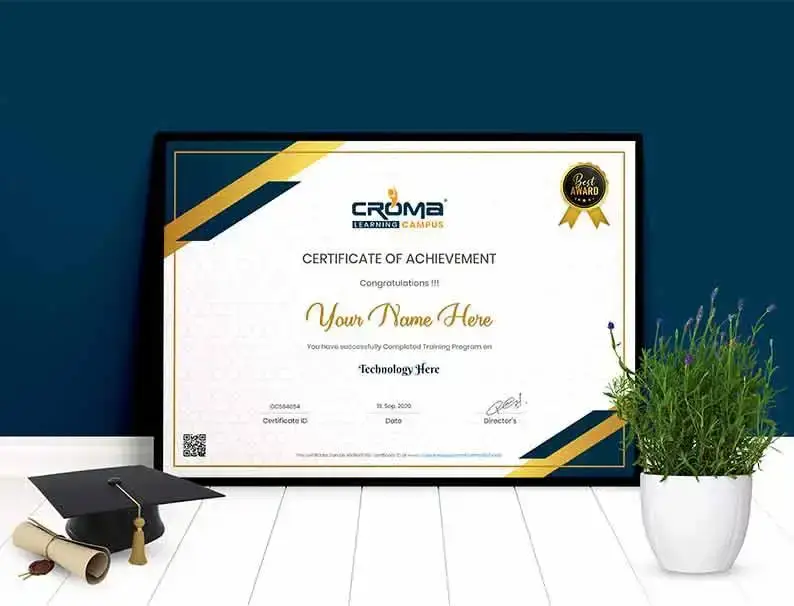Course Design By
Nasscom & Wipro
Starting at
Register Now
And Get
10%
OFF
Limited Time Offer*
Things you will learn:
Module 1: Infrastructure Setup
Module 2: Overview of DevOps
Module 3: Introduction to DevOps on Cloud
Module 4: Git, Jenkins & Maven (Version Control, Continuous Integration & Build)
Module 5: AWS (Amazon Web Services)
Module 6: Docker (Continuous Deployment)
Module 7: Puppet (Continuous Deployment)
Module 8: Ansible (Configuration Management)
Module 9: Kubernetes (Containerization using Kubernetes)
Module 10: Nagios (Continuous Monitoring with Nagios)
Things you will learn:
Module 1: Getting Started & Setting Up Labs
Module 2: Deploying Infrastructure with Terraform
Module 3: Read, Generate, Modify Configurations
Module 4: Terraform Provisioners
Module 5: Terraform Modules & Workspaces
Module 6: Remote State Management
Module 7: Security Primer
Things you will learn:
Module 1: Containerization Overview
Module 2: The Docker Engine
Module 3: Image Management & Registry
Module 4: Storage in Docker
Module 5: Orchestration in Docker
Module 6: Networking and Security
Module 7: Docker EE and Monitoring
Module 8: Docker with Kubernetes
Module 9: Docker with Microservices
Things you will learn:
Module 1: Kubernetes Core Concepts and Networking
Module 2: Kubernetes Services and Scheduling
Module 3: Kubernetes Controllers
Module 4: Persistent Storage in Kubernetes
Module 5: Securing Clusters
Module 6: Logging & Monitoring Clusters
Module 7: Troubleshooting Clusters
Things you will learn:
Module 1: Introduction to Ansible
Module 2: Ansible Architecture & Installation
Module 3: The Playbook Grammar
Module 4: Ansible Modules
Module 5: Ansible Roles
Module 6: Ansible Tower
Things you will learn:
Module 01: Introduction To CI/CD
Module 02: Getting Started with Jenkins
Module 03: Build Jobs and Configurations
Module 04: Configuring Build Pipelines
Module 05: Automated Testing in Jenkins
Module 06: Code Quality Improvement Using Jenkins
Module 07: Automated Deployment and Continuous Delivery
Module 08: Distributed System in Jenkins
Things you will learn:
Module 1: Evolution of Microservices
Module 2: Microservices Architecture
Module 3: Microservices Design
Module 4: Microservices Security
Module 5: Microservices Testing
Module 6: Microservices Reference Architecture
This training will comprise of up to 4 live projects respectively.
Course Design By

Nasscom & Wipro
Course Offered By

Croma Campus
You will get certificate after completion of program
.png)
Ansible
.png)
AWS
.png)
Devops
.png)
Docker

Start your journey with the best IT
training experts in India.

50% Average Salary Hike

You will get certificate after
completion of program

You will get certificate after
completion of program

You will get certificate after
completion of program
Get a peek through the entire curriculum designed that ensures Placement Guidance
Course Design By


Course Offered By


*Insights Displayed Are as Per Our Recorded Data
DevOps Engineer ₹7L - ₹14L
Automation Engineer ₹6L - ₹12L
Release Engineer ₹6L - ₹11L
Build Engineer ₹5L - ₹10L
CI/CD Engineer ₹7L - ₹14L
Cloud Engineer ₹6L - ₹12L
Systems Engineer ₹5L - ₹10L
Platform Engineer ₹9L - ₹16L
Monitoring Engineer ₹5L - ₹10L
Security Engineer ₹8L - ₹15L
Network Engineer ₹4L - ₹9L
Support Engineer ₹4L - ₹8L
Linux Engineer ₹5L - ₹10L
Docker Specialist ₹6L - ₹12L
Kubernetes Engineer ₹8L - ₹15L
Site Engineer ₹6L - ₹12L
Automation Specialist ₹7L - ₹11L
DevOps Consultant ₹10L - ₹18L
Terraform Expert ₹9L - ₹16L
Ansible Engineer ₹7L - ₹10L
Pipelines Engineer ₹6L - ₹11L
SRE Engineer ₹10L - ₹18L
Ops Analyst ₹5L - ₹9L
Cloud DevOps ₹8L - ₹15L
Cloud DevOps ₹8L - ₹15L
Ops Analyst ₹5L - ₹9L
SRE Engineer ₹10L - ₹18L
Pipelines Engineer ₹6L - ₹11L
Ansible Engineer ₹7L - ₹10L
Terraform Expert ₹9L - ₹16L
DevOps Consultant ₹10L - ₹18L
Automation Specialist ₹7L - ₹11L
Site Engineer ₹6L - ₹12L
Kubernetes Engineer ₹8L - ₹15L
Docker Specialist ₹6L - ₹12L
Linux Engineer ₹5L - ₹10L
Support Engineer ₹4L - ₹8L
Network Engineer ₹4L - ₹9L
Security Engineer ₹8L - ₹15L
Monitoring Engineer ₹5L - ₹10L
Platform Engineer ₹9L - ₹16L
Systems Engineer ₹5L - ₹10L
Cloud Engineer ₹6L - ₹12L
CI/CD Engineer ₹7L - ₹14L
Build Engineer ₹5L - ₹10L
Release Engineer ₹6L - ₹11L
Automation Engineer ₹6L - ₹12L
DevOps Engineer ₹7L - ₹14L

*Image for illustration only. Certificate subject to change.
Our Master program is exhaustive and this certificate is proof that you have taken a big leap in mastering the domain.
The knowledge and skill you've gained working on projects, simulation, case studies will set you ahead of competition.
Talk about it on Linkedin, Twitter, Facebook, boost your resume or frame it- tell your friend and colleagues about it.


.webp)
Total Exam Submitted
Best of support with us
The master's in DevOps engineering course is for aspiring DevOps engineers who wish to become experts in utilizing DevOps methodology for software/application development. During the DevOps Course, students will learn about key concepts of DevOps, DevOps processes & tools, CI/CD, etc. The main aim of the master in DevOps engineering training program is to help students become experts in utilizing the DevOps methodology. After completing this phenomenal training program, you can get a job as a:

There is a rise in the number of companies using DevOps methodology for software/application development. As a result, there is a huge demand for DevOps engineers in the market who can help them utilize the power of this phenomenal methodology. According to a survey, there is a 225% rise in DevOps engineering jobs in the market since the year 2013. This is why DevOps engineers get hefty salaries/remuneration from companies in which they work. In simple words, there are lots of opportunities for DevOps experts in the market.
With project-based training in the DevOps Engineer Training program, you will master the key concepts of this amazing methodology. Moreover, you will be equipped with all the key skills that are necessary for getting a job as a DevOps engineer.
![]() With project-based training in the DevOps engineering training program, you will master the key concepts of this amazing methodology. Moreover, you will be equipped with all the key skills that are necessary for getting a job as a DevOps engineer.
With project-based training in the DevOps engineering training program, you will master the key concepts of this amazing methodology. Moreover, you will be equipped with all the key skills that are necessary for getting a job as a DevOps engineer.
![]() After completing the DevOps engineering training program, you can quickly get a job in a respected company with a handsome salary package of ₹4 LPA to ₹14 LPA.
After completing the DevOps engineering training program, you can quickly get a job in a respected company with a handsome salary package of ₹4 LPA to ₹14 LPA.
![]() As per a survey, the DevOps market is going to reach the mark of $12.85 billion by the year 2025.
As per a survey, the DevOps market is going to reach the mark of $12.85 billion by the year 2025.
The main aim of the DevOps engineering training program is to help students master the vital or important concepts of DevOps. Besides this, the students will learn how to use this phenomenal methodology for software/app development.
Things you will learn:
The objective of a master in DevOps engineering training is to provide in-depth knowledge of DevOps methodology, concepts, and tools and make them expert DevOps engineers. The AWS DevOps Professional Certification course is developed along with expert DevOps engineers to make sure that it fulfills the changing demand of the software development industry.
For Voice Call
+91-971 152 6942For Whatsapp Call & Chat
+91-9711526942